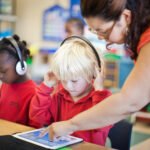Parent and Family Engagement Engaging parents and families is essential to promoting children’s learning and growth. The important elements and tactics to promote successful engagement.

Open Communication
Getting regular updates on kids’ academic achievements and school-related events keeps families informed and active. Giving families and educators a forum for input promotes communication in both directions.
Partnership in Learning
Incorporating families into the educational process fosters a shared sense of accountability. By reiterating concepts and skills taught in the classroom, families may facilitate learning at home.
Cultural Competence
Diverse backgrounds are valued and acknowledged, which enhances the learning environment. Culturally sensitive procedures give families a sense of inclusion and respect.

Supportive Environment
Establishing a friendly environment in schools encourages parental involvement. By providing families with tools and training, we can enable them to effectively support their children’s education.
Improved Academic Outcomes
Empirical studies demonstrate that active families are linked to improved academic achievement, elevated graduation rates, and heightened drive.

Enhanced Social Skills
Children who are involved in their families are better able to negotiate relationships and gain confidence as their social skills grow.
Family Workshops and Events
Plan seminars on parenting techniques academic subjects or particular teaching methods. Organize family friendly activities that promote involvement such game evenings or ethnic festivals.

Conclusion
Fostering a conducive learning environment requires involving families and parents in their children’s education. Schools may improve social development, raise academic standards, and foster a more welcoming community by forming solid relationships.
FAQs
Why is parent and family engagement important?
Stronger social skills, higher academic achievements, and closer ties between the home and the school are all results of engaged families supporting their kids’ education.
How can schools effectively communicate with families?
To inform families and promote candid communication, schools can use social media, emails, newsletters, and frequent meetings.
How can families support their children’s education at home?
By reading aloud, assisting with homework, playing educational games, and having conversations about schoolwork, families may support their children’s education.
What role do teachers play in fostering family engagement?
Instructors can establish rapport with parents, keep them updated on their child’s progress, and provide an invitation for them to join in class activities.
How can schools accommodate diverse family needs?
To guarantee inclusion, schools can offer resources that represent the ethnic backgrounds of families, flexible meeting schedules, and translation services.



